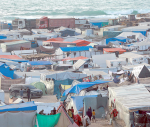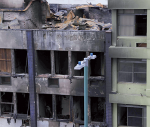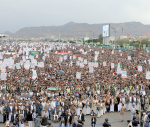You are here
Remembering forgotten Gaza
May 10,2016 - Last updated at May 10,2016
It has been almost two years since Israel waged another war on Gaza, one that remains the centre of controversy until today, even within Israeli security and military circles.
The 51-day aggression in the sweltering summer of 2014 against one of the most heavily populated enclaves on the globe resulted in the murder of more than 2,000 Palestinians, the majority women and children, and the maiming of thousands.
Entire neighbourhoods were reduced to rubble as Israel unleashed its unmatched firepower from land, air and sea.
Operation Protective Edge, as it was called by Israel, continued unabated for seven weeks, mainly to serve the political goals of Prime Minister Benjamin Netanyahu and his hawkish Cabinet allies.
But while the world has forgotten about Gaza, the fact remains that Israel’s war continues through other means.
A strict economic blockade is sapping life out of the besieged strip and if it continues, experts believe it will turn the 365-square-kilometre region where 1.8 million Palestinians live into an uninhabitable territory in a matter of few years.
Since July 2014, Gaza’s only electricity plant has been partly operational, with daily power outages disrupting sewage treatment stations and drinking water supplies and resulting in an unprecedented environmental catastrophe.
Some 30 per cent of Gazans have been denied regular water supply and raw sewage is being dumped into the sea, making the strip’s coastline the most polluted in the world.
The noiseless suffering of the people of Gaza has not stopped since the end of the Israeli military operation.
Last week, three toddlers from one family in Al Shati Refugee Camp succumbed as their house caught fire caused by candles lit in their room. It was a stark reminder of the daily misery of Gazans who try to cope with horrific living conditions.
Meanwhile, world attention has shifted elsewhere and the anguish of Gaza is being ignored.
Gaza’s economy has all but collapsed. The blockade means that little, if any, agriculture produce is allowed to pass through.
The unemployment rate is believed to have crossed the 50 per cent mark, and last year a World Bank report concluded that Israeli blockades, war and poor governance have left 43 per cent of people out of work.
According to Israeli human rights organisation B’Tselem, no raw materials have entered Gaza since June 2007, forcing 90 per cent of enterprises to cease operation.
This has meant that 80 per cent of Gaza households now live below the poverty line and 80 per cent of all Gazan families will literally starve without food aid from international agencies.
And since 2014, little has been done by the international community to end the Israeli siege, deliver reconstruction aid and revive the economy.
Israel has resisted all attempts to end its blockade and it is unfortunate that it has used the growing rift between Hamas, which has been in control of the strip since 2007, and the Palestinian Authority (PA), to continue its economic strangulation of Gaza.
Similarly, the political divide between Egypt’s current leadership and the Islamic movement in Gaza has hindered attempts to end the closure of the Rafah border crossing in the Sinai.
It is a sad fact that Cairo’s enmity with Hamas has led to the imposition of a vicious form of collective punishment, degrading further the strip’s infrastructure and civil services.
Hamas’ leadership bears its fair share of blame in prolonging the suffering of Gazans.
Fearing that it will lose its grip over the affairs of the strip, Hamas has found excuses not to implement a reconciliation agreement with the PA.
The agreement would have led to the formation of a national unity government that would have taken control of border crossings. Moreover, it would have paved the way for the holding of overdue presidential and legislative elections in the West Bank and Gaza Strip, putting an end to years of political deadlock.
Isolated from the rest of the world, Hamas continues its sabre rattling in relation to Israel, giving Netanyahu justification to tighten the siege at no cost to him.
But the situation in Gaza cannot go on for long with the threat of a humanitarian catastrophe looming close.
Gaza is the biggest concentration camp in the world today, and with economic and environmental disasters threatening its existence, the current situation has become untenable.
But for things to change, various Palestinian factions will have to address the deep rift that has scuttled efforts to reach unity.
Hamas cannot pin the blame entirely on President Mahmoud Abbas and others. It must realise that it cannot hold on to power in Gaza without a hefty price.
By the same token, the PA should not politicise the suffering of the people of Gaza and use it as a card to pressure Hamas.
The two must find unity, end the fracture and direct the blame towards the true culprit, which is Israel.
The writer is a journalist and political commentator based in Amman.













